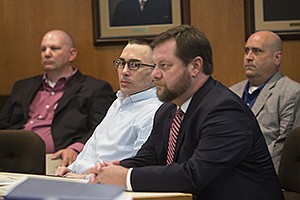NEW BOSTON, Texas-Defense experts testified Friday that a Texas prison inmate facing the death penalty for the fatal beating of a correctional officer has a "broken brain."
Billy Joel Tracy, 39, was convicted of capital murder by a Bowie County jury Oct. 27 in the July 15, 2015, killing of Correctional Officer Timothy Davison. Davison, 47, suffered massive head trauma after Tracy slipped a hand free of his cuffs and attacked with his fists and the officer's metal tray slot bar.
Friday the defense called doctors and scientists associated with the Mindset Consulting firm, a company that offers "consulting expertise for legal cases," according to its website. The defense experts testified as to Tracy's results on tests including blood work, an MRI, a PET scan and an EEG.
Bastrop, Texas, family practice physician Steven Yount testified under questioning from Mount Pleasant defense lawyer Mac Cobb that Tracy's brain abnormalities evident on an MRI discussed Thursday and PET and EEG scans discussed Friday, coupled with blood work he ordered lead him to conclude, "there is something wrong here, his brain is broken."
Yount said that Tracy has a low testosterone level which means that as time passes and Tracy ages he will become less aggressive. Yount said Tracy has a disconnect between the part of the brain that behaves rationally and keeps the "primal brain" in check.
"Now that we know and understand, then the specialists and experts can do their thing and he can be much better in the future," Yount testified. "No doctor can guarantee anything but helping him is within the realm of possibilities."
Under questioning from Assistant District Attorney Lauren Richards, Yount addressed Tracy's prison medical records. Yount agreed that the records reflect Tracy's unwillingness to cooperate with medical staff by refusing to submit to lab work necessary to monitor medication levels.
When asked to explain how Tracy's history of planning attacks for months fits with a lack of impulse control, Yount cited Texas Department of Criminal Justice staff and policy.
"I can't believe they only had one guard there," Yount said.
Richards quickly pointed out that Yount is not an expert on prison security. Yount went on to say that he believes once Tracy initiates an attack, he doesn't have the self-control to stop himself when the fight is over, likely because of his brain abnormalities.
Neuroscientist Andrew Newberg M.D. testified under questioning from Cobb that Tracy's PET scan shows he has issues in a variety of areas of the brain. Newberg said Tracy's scan shows he has decreased metabolic functioning in areas of the brain which may lead to problems with controlling emotional responses and predispose him to mood swings, poor impulse control and aggressive tendencies, among other things.
Under cross examination by Assistant District Attorney Kelley Crisp, Newberg testified that Tracy's scans indicate he could have a "broken brain" that has difficulty with impulse control, memory, abstract thinking and more. Crisp showed Newberg a letter Tracy wrote to a penpal in which he gives an in-depth opinion of national football, citing multiple teams, owners and players.
"It's not possible to know what's going on with somebody 100 percent of the time," Newberg said under questioning from Cobb. "The brain is a remarkable thing."
Neuroscientist Jeffrey Lewine Ph.D. testified that an EEG, a test which measures electrical activity in the brain, showed Tracy has "epileptic spikes."
Lewine also used the phrase "broken brain" to describe Tracy and said that Tracy's brain abnormalities likely contribute to his violent conduct. Lewine said he believes security precautions which might have prevented Tracy from getting out of his handcuffs and attacking Davison should have been in place.
On cross examination, Richards asked Lewine if Mindset Consulting is a "cottage industry" in capital murder cases. Lewine said he has testified in other capital cases and that the scans the experts rely on are "higher quality than those used in most hospitals."
Lewine agreed that brain scans were not performed on Tracy after he beat a 16-year-old girl in 1998, after he stabbed a female correctional officer in 2005 or after he sliced the face of a male correctional officer in 2009.
When Richards asked if it is possible for someone with the abnormalities apparent in Tracy's brain to live a completely normal life, Lewine said, "Anything's possible."
Testimony from defense experts is expected to continue Monday morning before 102nd District Judge Bobby Lockhart at the Bowie County courthouse in New Boston. The trial is expected to end next week.

